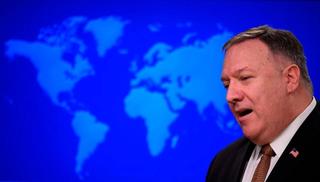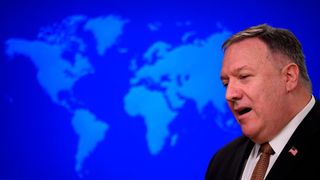Australia’s Sunday morning current affairs programs have been making news lately. A few weeks ago it was Australia’s minister for foreign affairs, Marise Payne, proposing an independent, international inquiry into the origins of COVID-19 on the ABC’s Insiders. On Sunday, US Secretary of State Mike Pompeo appeared on Sky News’ Outsiders, an oddity in itself, where he was invited to weigh in on the wisdom of Victoria signing on to China’s Belt and Road Initiative (BRI).
Pompeo made news with his warning that countries with commercial dealings with China, especially Five Eyes partners, need to ensure the security of communications of US citizens and American defence and intelligence agencies. Some BRI projects may be “straight-up commercial transactions”, but Pompeo warned that the United States “will not take any risk”, and that it “will simply disconnect” to preserve trusted networks for “important information”.
Pompeo made news with his warning that countries with commercial dealings with China, especially Five Eyes partners, need to ensure the security of communications of US citizens and American defence and intelligence agencies.
The word “disconnect” set social media alight. The US ambassador to Australia quickly pointed out that Pompeo was addressing a hypothetical, that communications projects are federal matters, and that Australia has shown great leadership in securing communications networks.
Let’s put to one side the question as to why on earth the US Secretary of State was talking to Outsiders about the Victorian government’s engagement with the BRI. The episode does reveal some tensions in Australia’s strongest and most important bilateral relationship.
Recent United States Studies Centre papers identify the pain points in the US-Australia alliance. Canberra wants Washington to be clearer and more consistent with its Indo-Pacific strategy and the necessary resourcing, to recommit to the institutions underpinning the “international rules-based order” and for less American unilateralism in trade and foreign policy that hurt steadfast allies such as Australia (for example, Australian agricultural and energy exports threatened by deals between US and China).

Washington, on the other hand, wants Canberra to do more in the Indo-Pacific and lessen its economic reliance on China. Some Washington insiders openly worry whether Australia is, or soon will be, a lost cause, provocatively asking “Who lost Australia?”.
It’s easy to see how these concerns arise. The lease of the port of Darwin to a Chinese company may have occurred during the Obama administration but many in the Washington strategic affairs community remember their shock. The extent of Chinese influence in Australian politics, but especially the Sam Dastyari matter, dismay both Democratic and Republican friends of Australia. So too does the long list of former politicians on the payrolls of Chinese entities.
Some Washington insiders openly worry whether Australia is, or soon will be, a lost cause, provocatively asking “Who lost Australia?”.
The strategic implications of the financial exposure of Australian universities to Chinese foreign students and, until recently, an almost willful naivete about research collaborations with Chinese universities and state-owned enterprises are well known to Washington. A grand doyen of American strategic thinking, Walter Russell Mead, last week penned “The People’s Republic of Queensland”, a widely read op-ed on the University of Queensland’s treatment of Drew Pavlou.
As well-known as Australia’s vulnerabilities are to the Americans — and as serious as they are — they are of course even better known to Canberra. Moreover, Pompeo would, or should, know that Australia was the first of the Five Eyes partners to not allow Huawei into its national broadband or 5G networks. Pompeo’s hypothetical “disconnect” is perhaps more for British consumption than Australian. Victoria joining the BRI is simply not that important and Pompeo knows it.
Pompeo’s comments have more to do with the febrile state of US domestic politics. The Trump administration is keen to put the blame for 100,000 COVID-19 deaths and Depression-level unemployment on someone. From calling COVID-19 the “China virus” to calling Joe Biden weak on China – at this point, anything and everything will be fair game for the Trump campaign. If underscoring China’s economic coercion of Australia can be considered evidence of China’s culpability for COVID-19, then why not?
Pompeo’s comments have more to do with the febrile state of US domestic politics. The Trump administration is keen to put the blame for 100,000 COVID-19 deaths and Depression-level unemployment on someone.
The irony is that in calling for an independent inquiry as to COVID-19’s origins, Australia was actually putting a little daylight between itself and the Trump administration. Prime Minister Morrison and Payne aren’t going anywhere near the “escape from a lab” origins story being run by Trump and Pompeo in recent weeks. Being an indispensable alliance partner does not require lending credence to hypotheses designed to distract and deflect American public opinion.
This recommendation also applies coming from the American side to Australia. The Chinese Communist Party has been doing a fantastic job of turning Australian public opinion against China, with some extraordinarily tone-deaf public diplomacy and stunts. Interventions by the US Secretary of State like this weekend's, with even hypothetical admonitions about “disconnecting” from trusted partners, do not help.
United States Studies Centre polling, like that of our peers, shows that Australians increasingly see the Chinese regime clearly. But by the same token, Australians see the tragedy unfolding in the United States: our greatest friend, and the most powerful nation on earth, floundering in its response to COVID-19, its vainglorious president distressingly short of empathy, running for re-election by running against his own administration’s public health recommendations.
In August, well before the pandemic, we found that only 19 per cent of Australians wanted Trump elected to a second term. With the political capital of Trump, and by extension his administration, at these woeful levels among Australians, alliance management might be better done by professionals behind closed doors, at least for the time being.






